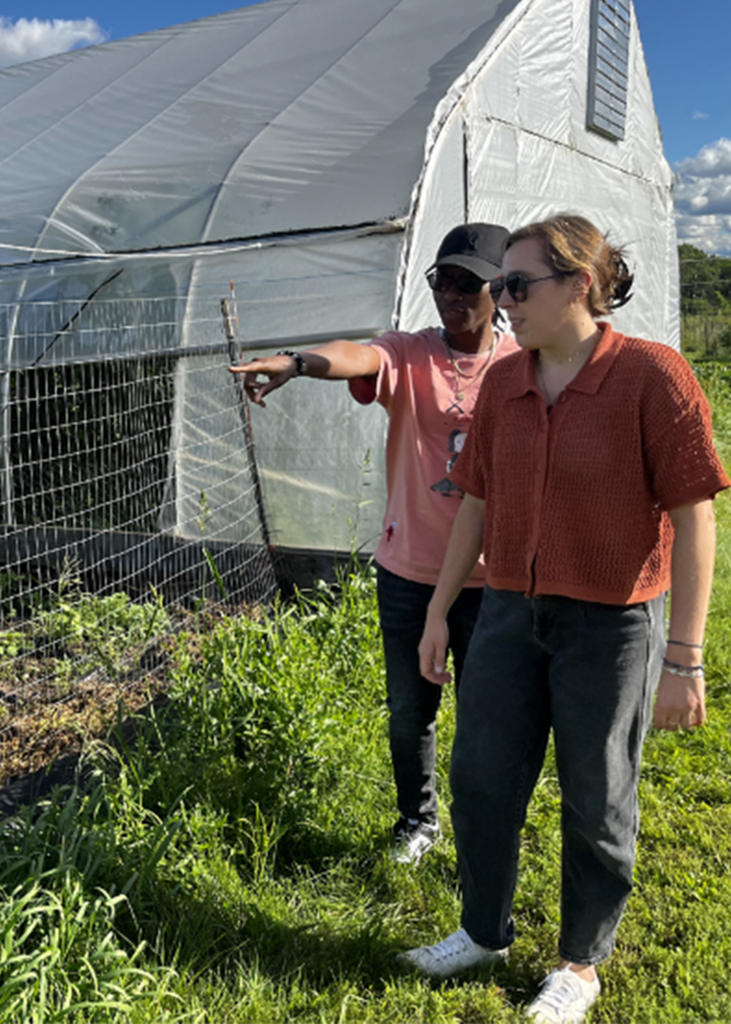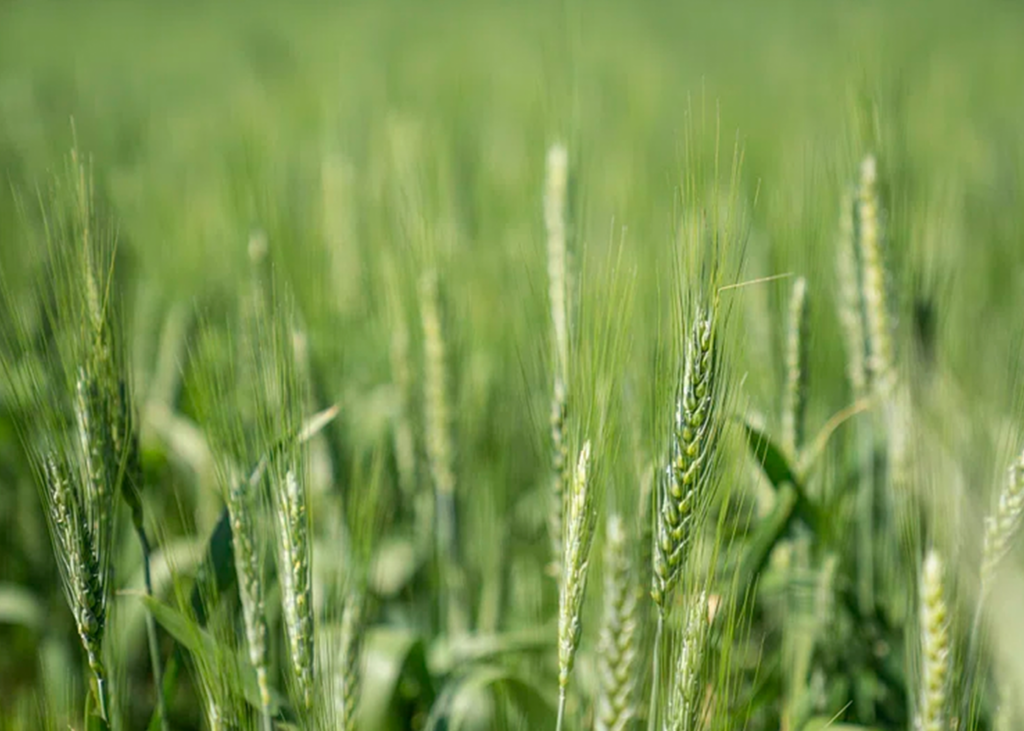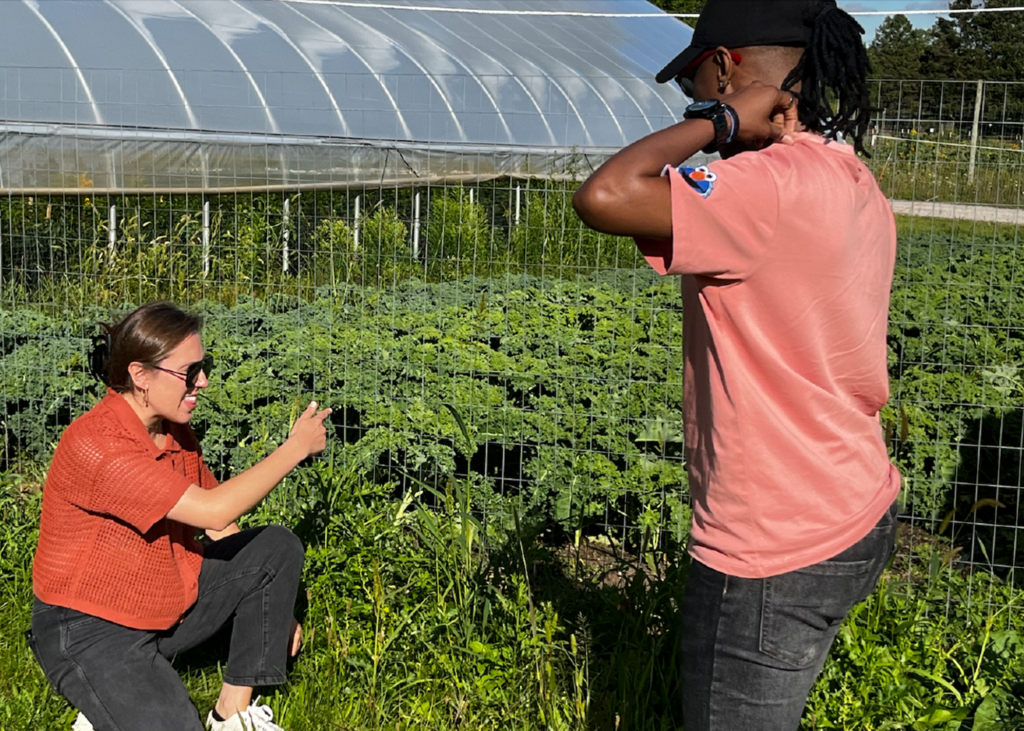The Sustainable Food Systems Initiative (SFSI) Summer Internship Fellowship aims to make low-paying or unpaid summer internships in food systems more accessible to University of Michigan Master-level graduate students, with the goal of lowering the barriers to diverse career exploration. The Fellowship is available to current Master’s students in any program at the University of Michigan.
Here are the experiences of our summer 2023 group!
Naomi Cutler

Internship Site: Raven Ridge Farm
1) Where were you for your internship?
Kalispell, MT
2) What organization did you work for?
Raven Ridge Farm
3) What were your responsibilities?
I joined the crew and farmed part time which included planting, harvesting, and processing a diverse array of vegetables. I also helped them ramp up their communications and community engagement including a farm tour and trellising workshop, a recipe database for their CSA members, and a poster series about the seasonality of their vegetables, the farming practices they use, and the history of their farm.
4) Summary about your experience:
I had a wonderful time working with Raven Ridge Farm this summer. I had very little prior experience in food systems, and felt like this summer was an opportunity to become more literate in sustainable farming while also providing my services in visual communications in a way that would benefit the farm. Cassady and Nathan, the owners of Raven Ridge, were very attentive teachers as I learned about their methods that they have honed over a decade of farming. I’m primarily interested in a career that focuses on using visual communication tools, especially mapping, as a way to help communities understand how climate disasters impact them. I have approached this field from perspectives in forestry, education, and recreation, but I hadn’t yet focused on the impact of disasters on food systems. Even throughout my summer I was able to see how climate impacts farming in real time. Last year, Montana had an extremely wet season and their fields were flooded for a good portion of the spring. This year, it was hot and dry in the Flathead Valley, so crops were ready a few weeks earlier than usual. While these events are climatic and wide-spread, I saw how large of an impact they had on this 1.5 acre farm which provides food to over 100 CSA members and countless other customers through their market and farm stand. It reinforced the idea for me that we need systems-level solutions to issues like these, but we also need to focus on implementation at the local level, which is where I’d like to go over the course of my career.
Angie Sillah

Internship Site: Detroit Dirt
1) Where were you for your internship?
Remote.
2) What organization did you work for?
Pashon Murray and Detroit Dirt.
3) What were your responsibilities?
My internship focused on developing a biomass waste market segmentation strategy for Detroit and the US since Pashon Murray is now working as a consultant.
Among my responsibilities was the identification of various sources of biomass waste within the city of Detroit and the segmentation of those sources into discrete groups according to the features, volume, and potential for composting of the garbage. I further broadened the scope of the segmentation analysis by looking at national trends in biomass waste and possible markets for composting. This was done for the entire United States.
These responsibilities were accomplished by collecting data from a variety of sources, such as waste management agencies, conducting interviews with firms such as FORSolutions and Chomp, and using public databases to gain an in-depth understanding of the technologies and enterprises involved in the composting of biomass waste. I was able to identify various categories of biomass waste in Detroit with the use of the data, some of which include food waste from restaurants, yard trash from residential areas, and agricultural byproducts from farms. In addition, I had the wonderful opportunity to collaborate with both Pashon and Claire in the design of slides for the Detroit Library’s summer camp, which focuses on encouraging students to get involved in composting and reducing their food waste.
4) Summary about your experience:
My summer internship at the Detroit Dirt Company was enriching and allowed me to contribute to sustainable trash management. Creating a biomass waste market segmentation approach has helped me identify local and nationwide composting difficulties and potential. This encounter has deepened my interest in food systems and sustainable waste management. Witnessing the positive effects of responsible waste management on urban agriculture and local food ecosystems has cemented my conviction in comprehensive solutions that satisfy environmental and societal requirements. Composting, biomass waste reduction, and urban farm produce quality have shown the promise for a more robust and self-sufficient food system. Engaging with waste management and urban agricultural stakeholders has given me a complete view of food system problems and potential. This experience has shown the potential for novel ways to bridge waste reduction and food production, promoting a circular and regenerative agriculture.
My internship has expanded my understanding of sustainable practices and shaped my career path. I was interested in sustainability and the environment before this internship. The chance to work on a real-world project and see the results has convinced me to work in sustainability, waste management, and food systems. These domains interact to create an exciting and powerful way to improve the world.
This internship also taught me the value of teamwork and multidisciplinary thinking. Sustainable waste management is challenging and requires environmental science, policy, commercial, and technology knowledge. I’m driven to pursue ongoing learning and skill development to holistically address these difficulties.
Finally, my internship with the Detroit Dirt Company has strengthened my food system enthusiasm and professional goals. Hands-on experience with real-world problems and solutions has given me a greater sense of purpose and direction, inspiring me to seek a profession that resonates with my beliefs and contributes to a more sustainable and resilient future.
Full write-up on Angie’s project here.
Daniel Vargas-Weil

Internship Site: Nature & Nurture Seeds Farm
1) Where were you for your internship?
Between Ann Arbor and Dexter.
2) What organization did you work for?
Nature & Nurture Seeds Farm, a farm that produces open-pollinated seeds.
3) What were your responsibilities?
I was a farm intern. Performed varied tasks, such as sowing, planting, preparing planting sites, maintaining crops, harvesting, processing harvested crops, and more.
4) Summary about your experience:
During my internship I learned a great deal about plant cultivation for food production and for seed production, about the crucial processes of seed processing and preservation, about how plant breeding is used to develop new varieties, about the differences between hybrid and open-pollinated varieties, and about many other technical aspects of farming and particularly farming for seed production.
Also, during the internship I got the chance to regularly talk and discuss broader topics related to sustainable food systems with the managers and owners of the farm. That was and amazing opportunity to get a better understanding of how seed production factors into food systems and about what farmers need to have an easier transition into sustainable models, from people that are actually working daily on a farm pursuing that objective. On top of that, this experience allowed me to get an insight into how a small scale farming operation looks like and the challenges that farmers meet on a regular basis.
What I learned during the internship, together with what I am learning from academics of the University of Michigan and my own experience as a former environmental policy practitioner is providing me a nice blend of perspectives to work on sustainable agriculture policy in the future. Now more than ever I see the need to change how the government gives support to farmers and how it incentivizes or disincentivizes different farming practices.
My interest and motivation for working in agriculture policy is higher than ever before, as I see more clearly than ever the incredible opportunity to make positive changes for people and the environment through improvements to current policies.
Kaia McKenney

Internship Sites: D-Town farm, Oakland Avenue Farm, Growing Hope, Cadillac Urban Garden, and the University of Michigan Campus Farm
1) Where were you for your internship?
I completed my internship in Detroit, Ypsilanti and Ann Arbor, Michigan.
2) What organization did you work for?
Over the course of the summer I worked at five different urban farms in the metro area: D-Town farm, Oakland Avenue Farm, Growing Hope, Cadillac Urban Garden, and the University of Michigan Campus Farm.
3) What were your responsibilities?
I traveled to a different farm each day, so my responsibilities shifted a lot! At the beginning of the summer we completed a lot of bed preparation in order to plant different herb/vegetable varieties. Into the later half of may and early June, we transplanted plants from small pots into the ground. Once transplanting was completed the rest of the tasks I completed consisted of weeding, bed maintenance, trellising, harvesting, and market attending.
4) Summary about your experience:
One of my favorite parts about completing this internship was learning how to identify vegetables and herbs from the early stage of planting to harvest. Prior to this summer I had participated in a gardening club in high school, but did not have much farming experience. Thinking back to the first day of the program, I could not differentiate the vast majority of the transplants and seeds in the various greenhouses. By the end of August I was well versed in the appearance and feel of most vegetables grown at each farm, and even some of the condition specifics each crop needs. It was also very empowering to learn a variety of skills that can be applied in my personal and professional work. At one of the farms I worked at, I and my fellow intern peers learned how to bake pizzas in an outdoor wood fired oven. As someone that loves to cook, it was such a highlight to use the foods we had helped to plant and create delicious food. Participating in the urban ag internship program reinforced my interest in urban food system work and design. This past summer I learned a lot and formed connections with the people at each farm and hope to integrate this knowledge into future academic and professional landscape architecture projects.
Emily Alexander

Internship Site: Indigo Ag
1)Where were you for your internship?
I stayed in Ann Arbor, MI and worked remotely.
2) What organization did you work for?
Indigo Ag.
3) What were your responsibilities?
-Supported the facilitation of Indigo’s Science & Policy Forum. This event convened 80+ NGO, academic, and policy partners who have helped define or shape market opinions on agriculture carbon credit quality, advance soil carbon science, and broaden market understanding of the role of Scope 3 regenerative agriculture programs. I helped my team with data capture and the implementation of new strategies.
-Helping to shape technical feedback for emerging frameworks and guidance documents for the carbon credit and Scope 3 market. This entailed working with Indigo scientists and standards experts to review guidance documents and provide feedback.
-Performed an agriculture carbon ecosystem analysis with Indigo Sustainability Policy & Engagement and Science teams including key academic and policy advisors. This included mapping the global ecosystem of technical experts supporting these frameworks and guidance documents, and identifying key gaps in Indigo advocacy efforts and areas of expertise.
4) Summary about your experience:
I had an incredible time interning at Indigo Ag; a fascinating company with a wide range of technical and policy experts. I supported the facilitation of Indigo’s Science & Policy Forum, an event convening 80+ NGO, academic, corporate and policy partners. These individuals have helped define and shape market opinions on agriculture carbon credit quality, advance soil carbon science, and broaden market understanding of the role of Scope 3 regenerative agriculture programs. I helped my team with data capture and the implementation of new strategies, performing a number of informal informational interviews with forum attendees and joined so many rich, nuanced conversations about how can we move our food system toward more sustainability and more just outcomes. I felt like I was ‘in the room where it happens.’
I built a meaningful relationship with my supervisor who has already become a role model and mentor for my career ahead. My experience this summer only validated for me that there are so many ways to pursue meaningful food systems work. While commodity row crop agriculture is not where I thought I would be focusing my time and energy regarding food systems work, I see that there is a need for equity-centric conversations in the market conversations we will undoubtably be having in the future. Row crop agriculture is not going anywhere, and has been neglected as a climate solution. The connected business enterprises are ripe for innovation, but environmental justice needs to be at the heart of the overhaul ahead. I see hope in carbon markets being a space to compensate those practicing sustainable practices; a step in the direction we need.
Claire O’Dea

Intership Site: Detroit Dirt
1) Where were you for your internship?
It was a hybrid position with the in-person portion taking place here on campus working with fellow SEAS student, Angie Sillah and by visiting the campus farm (there is no current workspace area in Detroit as Pashon is working as a consultant right now).
2) What organization did you work for?
Pashon Murray and her company, Detroit Dirt.
3) What were your responsibilities?
I was part of a team that worked to develop a biomass waste market in Detroit and around the United States. I also worked alongside Pashon and Angie to produce slides for a summer camp for the Detroit Library with the goal of engaging student aged children in food waste and composting.
4) Summary about your experience: I have always had an interest in food systems but this summer experience was the first time I have had the opportunity to view food systems from a waste perspective. Now I see food waste as a resource instead of an end of life in a landfill’s perspective. I am grateful for the opportunities I have had this summer and for the connections Pashon Murray provided us to talk to organizations who are working to achieve reductions in food waste. In the United States, there is currently a gap in the biomass waste market with the potential to grow as consumption increases. Having been part of the team trying to develop the market in the form of a flow chart and eventually a toolkit that Pashon can use when individuals or businesses approach and seek out her help was an enriching experience that is unique and on the cutting edge of the markets in the U.S. I am grateful to have had the experience to be part of a team striving to make a difference in food systems and the current state of food waste.
Full write-up on Claire’s project here.


